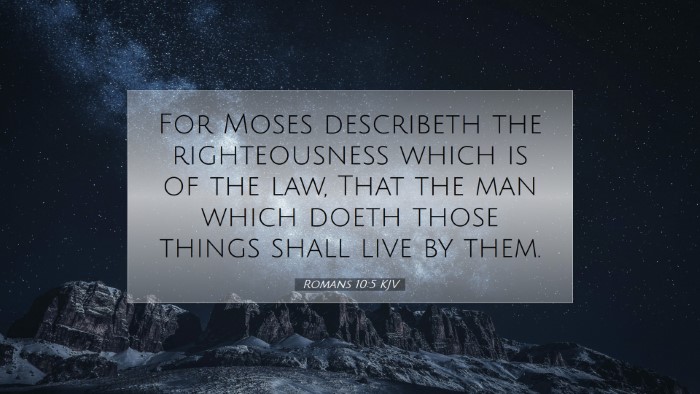Old Testament
Genesis Exodus Leviticus Numbers Deuteronomy Joshua Judges Ruth 1 Samuel 2 Samuel 1 Kings 2 Kings 1 Chronicles 2 Chronicles Ezra Nehemiah Esther Job Psalms Proverbs Ecclesiastes Song of Solomon Isaiah Jeremiah Lamentations Ezekiel Daniel Hosea Joel Amos Obadiah Jonah Micah Nahum Habakkuk Zephaniah Haggai Zechariah MalachiRomans 10:5
Romans 10:5 KJV
For Moses describeth the righteousness which is of the law, That the man which doeth those things shall live by them.
Romans 10:5 Bible Commentary
Commentary on Romans 10:5
Romans 10:5 states: "For Moses writes about the righteousness which is of the law, 'The man who does those things shall live by them.'" This verse serves as a pivotal point in the Apostle Paul's discourse on righteousness and the fulfillment of the Law, drawing upon the authority of Moses to highlight the nature of legal righteousness.
Contextual Overview
In the broader context of Romans, Paul contrasts the righteousness that comes by faith with the righteousness that comes from the law. Romans 10:5 emphasizes the principle that adherence to the law requires perfect obedience, a standard that no human can ultimately meet.
Insights from Matthew Henry
Matthew Henry elaborates on this verse by stating that the righteousness of the law is based on obedience; one must engage in all aspects of the law to be justified. He notes that the reference to Moses highlights the seriousness and weight of the law. Henry underscores that the law is good, but it exposes the sinfulness of humanity, revealing our inability to attain righteousness through our own efforts.
- Obedience Required: Henry draws attention to the phrase "the man who does those things shall live by them", emphasizing that continuous obedience is required for the law to provide life.
- Limitations of the Law: He also reminds readers that the law brings knowledge of sin, rather than justification, since the breaking of even one commandment incurs guilt before God.
Insights from Albert Barnes
Albert Barnes offers a systematic examination of this text. He interprets it as a foundational principle that the law necessitates perfect compliance. Barnes clarifies that Paul is not negating the importance of the law; rather, he is demonstrating its ultimate inability to provide salvation for those who fail to meet its demands.
- Righteousness of the Law: Barnes notes that the law requires adherence to all of its commands, asserting that righteousness under the law depends entirely upon human actions.
- Focus on Christ: The implication is that since all have sinned and fall short of the glory of God (cf. Romans 3:23), righteousness must come through faith in Jesus Christ rather than through works of the law.
Insights from Adam Clarke
Adam Clarke provides a rich theological reflection on Romans 10:5, paralleling the text with the broader message of grace found in the New Covenant. Clarke highlights that the righteousness of the law is accessible only through perfect obedience, making it ultimately unattainable for sinful man.
- Human Limitations: Clarke emphasizes that the law's demands showcase human limitations and sinfulness, leading to the necessity of a Savior.
- Righteousness by Faith: He contrasts this with faith, which is the means by which believers are justified, marking a transition from the law to grace, reflecting the message of Romans 1:17.
Theological Implications
The verses surrounding Romans 10:5 encapsulate the apostolic message of redemption and the limitations of the law. This verse acts as a bridge, connecting the law's demands with the evangelistic appeal for faith in Christ.
- Understanding Justification: For pastors and scholars, this verse underlines the importance of distinguishing between justification by works and justification by faith. It serves as a reminder of the necessity of recognizing Christ as the fulfillment of the law.
- Application for Believers: For believers, this implies a life oriented towards faith and reliance upon God's grace rather than human achievement.
Conclusion
In summary, Romans 10:5 displays a critical theological principle which serves as a reminder of human failure under the law and the indispensable grace offered through faith in Christ. In drawing insights from esteemed commentators like Matthew Henry, Albert Barnes, and Adam Clarke, a clearer picture emerges: while the law demonstrates God’s standard of righteousness, it is through faith that believers can truly attain righteousness before God.


